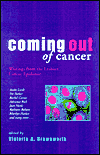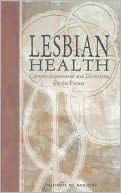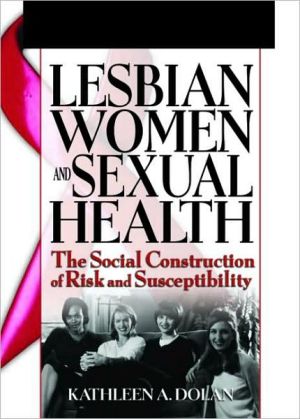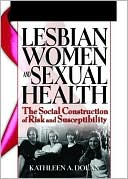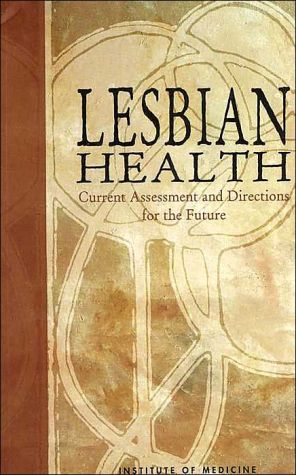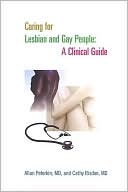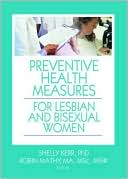Coming Out of Cancer: Writings from the Lesbian Cancer Epidemic
One-third of women run a lifetime risk of developing cancer, and studies have shown that lesbians are especially at risk. They often don't access healthcare because of homophobia in the medical establishment and inadequate insurance coverage. With its diversity of views and experience, Coming out of Cancer includes contributions from Audre Lorde, Ruthann Robson, Pat Parker, Rachel Carson, and Dr. Susan Love and offers information and support for survivors, loved ones, and community activists.
Search in google:
One-third of women run a lifetime risk of developing cancer, and studies have shown that lesbians are especially at risk. They often don't access healthcare because of homophobia in the medical establishment and inadequate insurance coverage. With its diversity of views and experience, Coming out of Cancer includes contributions from Audre Lorde, Ruthann Robson, Pat Parker, Rachel Carson, and Dr. Susan Love and offers information and support for survivors, loved ones, and community activists. Publishers Weekly While the term "epidemic" is slightly misleading, according to Dr. Susan Love (interviewed in this collection), lesbians may indeed be at a greater risk for breast cancer because they are less likely to get pregnant, and early pregnancy helps prevent the disease. In addition, editor Brownworth writes, "Our experiences with sexism, homophobia and racism make it less likely for us to seek out medical care." Brownworth, a medical reporter and author (Too Queer: Essays from a Radical Life, etc.), has collected stories, memoirs, poetry, graphic art and articles written by and about lesbians with cancer. The volume opens with a selection by the late poet Audre Lorde, whose Cancer Journals were among the first writings to bring breast cancer out of the closet. An excerpt from Ellen Leopold's collection of Rachel Carson's letters to her physician documents the environmentalist's struggle to understand her disease (the author of Silent Spring saw a connection between pesticides and cancer). Exceptionally moving is "Who Killed the Shark?" in which Brownworth pays tribute to an early lover who endured a long, painful death from colon cancer because she was too poor to have access to competent medical attention. Paula Berg, a health law professor, provides clear information on how to obtain adequate health insurance for cancer treatments. Joan Nestle, co-founder of New York City's Herstory Archives, describes her battle with colon cancer, and there is a moving and erotic excerpt from the novel Murder at the Nightwood Bar by Katherine V. Forrest. Covering a broad range of experiences, this is a rich and useful collection that will have no trouble reaching its target market among lesbian readers. (Oct.) FYI: All proceeds from this volume will be donated to the Mautner Project for Lesbians with Cancer. Copyright 2000 Cahners Business Information.
\ \ \ \ \ Chapter One\ \ \ A Burst of Light\ Living with Cancer\ \ \ \ * * *\ \ \ Audre Lorde\ \ \ though we may land here there is no other landing to choose our meaning we must make it new.\ Muriel Rukeyser\ \ \ Introduction\ The year I became fifty felt like a great coming together for me. I was very proud of having made it for half a century, and in my own style. "Time for a change," I thought, "I wonder how I'm going to live the next half."\ On February 1st, two weeks before my fiftieth birthday, I was told by my doctor that I had liver cancer, metastasized from the breast cancer for which I had had a mastectomy six years before.\ At first I did not believe it. I continued with my previously planned teaching trip to Europe. As I grew steadily sicker in Berlin, I received medical information about homeopathic alternatives to surgery, which strengthened my decision to maintain some control over my life for as long as possible. I believe that decision has prolonged my life, together with the loving energies of women who supported me in that decision and in the work which gives that life shape.\ The struggle with cancer now informs all my days, but it is only another face of that continuing battle for self-determination and survival that Black women fight daily, often in triumph. The following excerpts are from journals kept during my first three years of living with cancer.\ \ \ March 18,1984\ En route to St. Croix, Virgin Islands\ I've written nothing of the intensity with which I've lived the last few weeks. The hepatologist who tried to frighten me into an immediate liver biopsy without even listening to my objections and questions. Seeing the growth in my liver on the CAT scan, doing a face-off with death, again. Not again, just escalated. This mass in my liver is not a primary liver tumor, so if it is malignant, it's most likely metastasized breast cancer. Not curable. Arrestable, not curable. This is a very bad dream, and I'm the only person who can wake myself up. I had a talk before I left with Peter, my breast surgeon. He says that if it is liver cancer, with the standard treatments—surgery, radiation, and chemotherapy—we're talking four or five years at best. Without treatment, he says, maybe three or four.\ In other words, western medicine doesn't have a very impressive track record with cancer metastasized to the liver.\ In the light of those facts, and from all the reading I've been doing these past weeks (thank the goddess for Barnes & Noble's Medical Section), I've made up my mind not to have a liver biopsy. It feels like the only reasonable decision for me. I'm asymptomatic now except for a vicious gallbladder. And I can placate her. There are too many things I'm determined to do that I haven't done yet. Finish the poem "Outlines." See what Europe's all about. Make Deotha Chamber's story live.\ If I have this biopsy and it is malignant, then a whole course of action will be established simply by their intrusion into the suspect site. Yet if this tumor is malignant, I want as much good time as possible, and their treatments aren't going to make a hell of a lot of difference in terms of extended time. But they'll make a hell of a lot of difference in terms of my general condition and how I live my life.\ On the other hand, if this is benign, I believe surgical intervention into fatty tissue of any kind can start the malignant process in what otherwise might remain benign for a long time. I've been down that road before.\ I've decided this is a chance I have to take. If this were another breast tumor, I'd go for surgery again, because the organ comes off. But with the tie-in between estrogens, fat cells, and malignancies I've been reading about, cutting into my liver seems to me to be too much of a risk for too little return in terms of time. And it might be benign, some little aberrant joke between my liver and the universe.\ Twenty-two hours of most days I don't believe I have liver cancer. Most days. Those other two hours of the day are pure hell, and there's so much work I have to do in my head in those two hours, too, through all the terror and uncertainties.\ I wish I knew a doctor I could really trust to talk it all over with. Am I making the right decision? I know I have to listen to my body. If there's one thing I've learned from all the work I've done since my mastectomy, it's that I must listen keenly to the messages my body sends. But sometimes they are contradictory.\ Dear goddess! Face-up again against the renewal of vows. Do not let me die a coward, mother. Nor forget how to sing. Nor forget song is a part of mourning as light is a part of sun.\ \ \ June 1, 1984\ Berlin\ My classes are exciting and exhausting. Black women are hearing about them and their number is increasing.\ I can't eat cooked food and I am getting sicker. My liver is so swollen I can feel it under my ribs. I've lost almost fifty pounds. That's a switch, worrying about losing weight. My friend Dagmar, who teaches here, has given me the name of a homeopathic doctor specializing in the treatment of cancer, and I've made an appointment to see her when I come back from the Feminist Bookfair in London next week. She's an anthroposophic doctor, and they believe in surgery only as a last resort.\ In spite of all this, I'm doing good work here. I'm certainly enjoying life in Berlin, sick or not. The city itself is very different from what I'd expected. It is lively and beautiful, but its past is never very far away, at least not for me. The silence about Jews is absolutely deafening, chilling. There is only one memorial in the whole city and it is to the Resistance. At the entrance is a huge grey urn with the sign, "This urn contains earth from German concentration camps." It is such a euphemistic evasion of responsibility and an invitation to amnesia for the children that it's no wonder my students act like Nazism was a bad dream not to be remembered.\ There is a lot of networking going on here among women, collectives and work enterprises as well as political initiatives, and a very active women's cultural scene. I may be too thin, but I can still dance!\ \ \ June 7, 1984\ Berlin\ Dr. Rosenberg agrees with my decision not to have a biopsy, but she has said I must do something quickly to strengthen my bodily defenses. She's recommended I begin Iscador injections three times weekly.\ Iscador is a biological made from mistletoe which strengthens the natural immune system, and works against the growth of malignant cells. I've started the injections, along with two other herbals that stimulate liver function. I feel less weak.\ I am listening to what fear teaches. I will never be gone. I am a scar, a report from the frontlines, a talisman, a resurrection. A rough place on the chin of complacency. "What are you getting so upset about, anyway?" a student asked in class, "You're not Jewish!"\ So what if I am afraid? Of stepping out into the morning? Of dying? Of unleashing the damned gall where hatred swims like a tadpole waiting to swell into the arms of war? And what does that war teach when the bruised leavings jump an insurmountable wall where the glorious Berlin chestnuts and orange poppies hide detection wires that spray bullets which kill?\ My poems are filled with blood these days because the future is so bloody. When the blood of four-year-old children runs unremarked through the alleys of Soweto, how can I pretend that sweetness is anything more than armor and ammunition in an on-going war?\ I am saving my life by using my life in the service of what must be done. Tonight as I listened to the ANC speakers from South Africa at the Third World People's Center here, I was filled with a sense of self answering necessity, of commitment as a survival weapon. Our battles are inseparable. Every person I have ever been must be actively enlisted in those battles, as well as in the battle to save my life.\ \ \ June 9, 1984\ Berlin\ At the poetry reading in Zurich this weekend, I found it so much easier to discuss racism than to talk about The Cancer Journals. Chemical plants between Zurich and Basel have been implicated in a definite rise in breast cancer in this region, and women wanted to discuss this. I talked as honestly as I could, but it was really hard. Their questions presume a clarity I no longer have.\ It was great to have Gloria there to help field all those questions about racism. For the first time in Europe, I felt I was not alone but answering as one of a group of Black women—not just Audre Lorde!\ I am cultivating every iota of my energies to do battle with the possibility of liver cancer. At the same time, I am discovering how furious and resistant some pieces of me are, as well as how terrified.\ In this loneliest of places, I examine every decision I make within the light of what I've learned about myself and that self-destructiveness implanted inside of me by racism and sexism and the circumstances of my life as a Black woman.\ \ \ Mother why were we armed to fight with cloud wreathed swords and javelins of dust?\ \ \ Survival isn't some theory operating in a vacuum. It's a matter of my everyday living and making decisions.\ How do I hold faith with sun in a sunless place? It is so hard not to counter this despair with a refusal to see. But I have to stay open and filtering no matter what's coming at me, because that arms me in a particularly Black woman's way. When I'm open, I'm also less despairing. The more clearly I see what I'm up against, the more able I am to fight this process going on in my body that they're calling liver cancer. And I am determined to fight it even when I am not sure of the terms of the battle nor the face of victory. I just know I must not surrender my body to others unless I completely understand and agree with what they think should be done to it. I've got to look at all of my options carefully, even the ones I find distasteful. I know I can broaden the definition of winning to the point where I can't lose.\ \ \ June 10, 1984\ Berlin\ Dr. Rosenberg is honest, straightforward, and pretty discouraging. I don't know what I'd do without Dagmar there to translate all her grim pronouncements for me. She thinks it's liver cancer, too, but she respects my decision against surgery. I mustn't let my unwillingness to accept this diagnosis interfere with getting help. Whatever it is, this seems to be working.\ We all have to die at least once. Making that death useful would be winning for me. I wasn't supposed to exist anyway, not in any meaningful way in this fucked-up whiteboys' world. I want desperately to live, and I'm ready to fight for that living even if I die shortly. Just writing those words down snaps every thing I want to do into a neon clarity. This European trip and the Afro-German women, the Sister Outsider collective in Holland, Gloria's great idea of starting an organization that can be a connection between us and South African women. For the first time I really feel that my writing has a substance and stature that will survive me.\ I have done good work. I see it in the letters that come to me about Sister Outsider, I see it in the use the women here give the poetry and the prose. But first and last I am a poet. I've worked very hard for that approach to living inside myself, and everything I do, I hope, reflects that view of life, even the ways I must move now in order to save my life.\ I have done good work. There is a hell of a lot more I have to do. And sitting here tonight in this lovely green park in Berlin, dusk approaching and the walking willows leaning over the edge of the pool caressing each other's fingers, birds birds birds singing under and over the frogs, and the smell of new-mown grass enveloping my sad pen, I feel I still have enough moxie to do it all, on whatever terms I'm dealt, timely or not. Enough moxie to chew the whole world up and spit it out in bite-sized pieces, useful and warm and wet and delectable because they came out of my mouth.\ \ \ November 21, 1985\ New York City\ It feels like the axe is falling. There it is on the new CAT scan—another mass growing in my liver, and the first one is spreading. I've found an anthroposophic doctor in Spring Valley who suggests I go to the Lukas Klinik, a hospital in Switzerland where they are conducting the primary research on Iscador, as well as diagnosing and treating cancers.\ I've known something is wrong from the returning pains and the dimming energies of my body. My classes have been difficult, and most days I feel like I'm going on sheer will power alone which can be very freeing and seductive but also very dangerous. Limited. I'm running down. But I'd do exactly what I'm doing anyway, cancer or no cancer.\ A. will lend us the money to go to Switzerland, and Frances will come with me. I think they will be able to find out what is really wrong with me at the Lukas Klinik, and if they say these growths in my liver are malignant, then I will accept that I have cancer of the liver. At least there they will be able to adjust my Iscador dosage upward to the maximum effect, because that is the way I have decided to go and I'm not going to change now. Obviously, I still don't accept these tumors in my liver as cancer, although I know that could just be denial on my part, which is certainly one mechanism for coping with cancer. I have to consider denial as a possibility in all of my planning, but I also feel that there is absolutely nothing they can do for me at Sloan-Kettering except cut me open and then sew me back up with their condemnations inside me.\ \ \ December 7, 1985\ New York City\ My stomach x-rays are clear, and the problems in my GI series are all circumstantial. Now that the doctors here have decided I have liver cancer, they insist on reading all their findings as if that were a fait accompli. They refuse to look for any other reason for the irregularities in the x-rays, and they're treating my resistance to their diagnosis as a personal affront. But it's my body and my life and the goddess knows I'm paying enough for all this, I ought to have a say.\ The flame is very dim these days. It's all I can do to teach my classes at Hunter and crawl home. Frances and I will leave for Switzerland as soon as school is over next week. The Women's Poetry Center will be dedicated at Hunter the night before I leave. No matter how sick I feel, I'm still afire with a need to do something for my living. How will I be allowed to live my own life, the rest of my life?\ \ \ November 8, 1986\ New York City\ If I am to put this all down in a way that is useful, I should start with the beginning of the story.\ Sizable tumor in the right lobe of the liver, the doctors said. Lots of blood vessels in it means it's most likely malignant. Let's cut you open right now and see what we can do about it. Wait a minute, I said. I need to feel this thing out and see what's going on inside myself first, I said, needing some time to absorb the shock, time to assay the situation and not act out of panic. Not one of them said, I can respect that, but don't take too long about it.\ Instead, that simple claim to my body's own processes elicited such an attack response from a reputable Specialist In Liver Tumors that my deepest—if not necessarily most useful—suspicions were totally aroused.\ What that doctor could have said to me that I would have heard was, "You have a serious condition going on in your body and whatever you do about it you must not ignore it or delay deciding how you are going to deal with it because it will not go away no matter what you think it is." Acknowledging my responsibility for my own body. Instead, what he said to me was, "If you do not do exactly what I tell you to do right now without questions you are going to die a horrible death." In exactly those words.\ I felt the battle lines being drawn up within my own body.\ I saw this specialist in liver tumors at a leading cancer hospital in New York City, where I had been referred as an outpatient by my own doctor.\ The first people who interviewed me in white coats from behind a computer were only interested in my health-care benefits and proposed method of payment. Those crucial facts determined what kind of plastic ID card I would be given, and without a plastic ID card, no one at all was allowed upstairs to see any doctor, as I was told by the uniformed, pistoled guards at all the stairwells.\ From the moment I was ushered into the doctor's office and he saw my x-rays, he proceeded to infantalize me with an obviously well-practiced technique. When I told him I was having second thoughts about a liver biopsy, he glanced at my chart. Racism and Sexism joined hands across his table as he saw I taught at a university. "Well, you look like an intelligent girl," he said, staring at my one breast all the time he was speaking. "Not to have this biopsy immediately is like sticking your head in the sand." Then he went on to say that he would not be responsible when I wound up one day screaming in agony in the corner of his office!\ I asked this specialist in liver tumors about the dangers of a liver biopsy spreading an existing malignancy, or even encouraging it in a borderline tumor. He dismissed my concerns with a wave of his hand, saying, instead of answering, that I really did not have any other sensible choice.\ I would like to think that this doctor was sincerely motivated by a desire for me to seek what he truly believed to be the only remedy for my sickening body, but my faith in that scenario is considerably diminished by his $250 consultation fee and his subsequent medical report to my own doctor containing numerous supposedly clinical observations of obese abdomen and remaining pendulous breast.\ In any event, I can thank him for the fierce shard lancing through my terror that shrieked there must be some other way, this doesn't feel right to me. If this is cancer and they cut me open to find out, what is stopping that intrusive action from spreading the cancer, or turning a questionable mass into an active malignancy? All I was asking for was the reassurance of a realistic answer to my real questions, and that was not forthcoming. I made up my mind that if I was going to die in agony on somebody's office floor, it certainly wasn't going to be his! I needed information, and pored over books on the liver in Barnes & Noble's Medical Textbook Section on Fifth Avenue for hours. I learned, among other things, that the liver is the largest, most complex, and most generous organ in the human body. But that did not help me very much.\ In this period of physical weakness and psychic turmoil, I found myself going through an intricate inventory of rage. First of all at my breast surgeon—had he perhaps done something wrong? How could such a small breast tumor have metastasized? Hadn't he assured me he'd gotten it all, and what was this now anyway about micro-metastases? Could this tumor in my liver have been seeded at the same time as my breast cancer? There were so many unanswered questions, and too much that I just did not understand.\ But my worst rage was the rage at myself. For a brief time I felt like a total failure. What had I been busting my ass doing these past six years if it wasn't living and loving and working to my utmost potential? And wasn't that all a guarantee supposed to keep exactly this kind of thing from ever happening again? So what had I done wrong and what was I going to have to pay for it and WHY ME?\ But finally a little voice inside me said sharply, "Now really, is there any other way you would have preferred living the past six years that would have been more satisfying? And be that as it may, should or shouldn't isn't even the question. How do you want to live the rest of your life from now on and what are you going to do about it?" Time's awasting!\ Gradually, in those hours in the stacks of Barnes & Noble, I felt myself shifting into another gear. My resolve strengthened as my panic lessened. Deep breathing, regularly. I'm not going to let them cut into my body again until I'm convinced there is no other alternative. And this time, the burden of proof rests with the doctors because their record of success with liver cancer is not so good that it would make me jump at a surgical solution. And scare tactics are not going to work. I have been scared now for six years and that hasn't stopped me. I've given myself plenty of practice in doing whatever I need to do, scared or not, so scare tactics are just not going to work. Or I hoped they were not going to work. At any rate, thank the goddess, they were not working yet. One step at a time.\ But some of my nightmares were pure hell, and I started having trouble sleeping.\ In writing this I have discovered how important some things are that I thought were unimportant. I discovered this by the high price they exact for scrutiny. At first I did not want to look again at how I slowly came to terms with my own mortality on a level deeper than before, nor with the inevitable strength that gave me as I started to get on with my life in actual time. Medical textbooks on the liver were fine, but there were appointments to be kept, and bills to pay, and decisions about my upcoming trip to Europe to be made. And what do I say to my children? Honesty has always been the bottom line between us, but did I really need them going through this with me during their final difficult years at college? On the other hand, how could I shut them out of this most important decision of my life?\ I made a visit to my breast surgeon, a doctor with whom I have always been able to talk frankly, and it was from him that I got my first trustworthy and objective sense of timing. It was from him that I learned that the conventional forms of treatment for liver metastases made little more than one year's difference in the survival rate. I heard my old friend Clem's voice coming back to me through the dimness of thirty years: "I see you coming here trying to make sense where there is no sense. Try just living in it. Respond, alter, see what happens." I thought of the African way of perceiving life, as experience to be lived rather than as problem to be solved.\ Homeopathic medicine calls cancer the cold disease. I understand that down to my bones that quake sometimes in their need for heat, for the sun, even for just a hot bath. Part of the way in which I am saving my own life is to refuse to submit my body to cold whenever possible.\ In general, I fight hard to keep my treatment scene together in some coherent and serviceable way, integrated into my daily living and absolute. Forgetting is no excuse. It's as simple as one missed shot could make the difference between a quiescent malignancy and one that is growing again. This not only keeps me in an intimate, positive relationship to my own health, but it also underlines the fact that I have the responsibility for attending my own health. I cannot simply hand over that responsibility to anybody else.\ Which does not mean I give in to the belief, arrogant or naive, that I know everything I need to know in order to make informed decisions about my body. But attending my own health, gaining enough information to help me understand and participate in the decisions made about my body by people who know more medicine than I do, are all crucial strategies in my battle for living. They also provide me with important prototypes for doing battle in all other arenas of my life.\ Battling racism and battling heterosexism and battling apartheid share the same urgency inside me as battling cancer. None of these struggles are ever easy, and even the smallest victory is never to be taken for granted. Each victory must be applauded, because it is so easy not to battle at all, to just accept and call that acceptance inevitable.\ And all power is relative. Recognizing the existence as well as the limitations of my own power, and accepting the responsibility for using it in my own behalf, involve me in direct and daily actions that preclude denial as a possible refuge. Simone de Beauvoir's words echo in my head: "It is in the recognition of the genuine conditions of our lives that we gain the strength to act and our motivation for change."\ \ \ November 17, 1986\ New York City\ How has everyday living changed for me with the advent of a second cancer? I move through a terrible and invigorating savor of now—a visceral awareness of the passage of time, with its nightmare and its energy. No more long-term loans, extended payments, twenty-year plans. Pay my debts. Call the tickets in, the charges, the emotional IOU's. Now is the time, if ever, once and for all, to alter the patterns of isolation. Remember that nice lady down the street whose son you used to cross at the light and who was always saying, "Now if there's ever anything I can do for you, just let me know." Well, her boy's got strong muscles and the lawn needs mowing.\ I am not ashamed to let my friends know I need their collective spirit—not to make me live forever, but rather to help me move through the life I have. But I refuse to spend the rest of that life mourning what I do not have.\ If living as a poet—living on the front lines—has ever had meaning, it has meaning now. Living a self-conscious life, vulnerability as armor.\ I spend time every day meditating upon my physical self in battle, visualizing the actual war going on inside my body. As I move through the other parts of each day, that battle often merges with particular external campaigns, both political and personal. The devastations of apartheid in South Africa and racial murder in Howard Beach feel as critical to me as cancer.\ Among my other daily activities I incorporate brief periods of physical self-monitoring without hysteria. I attend the changes within my body, anointing myself with healing light. Sometimes I have to do it while sitting on the Staten Island Ferry on my way home, surrounded by snapping gum and dirty rubber boots, all of which I banish from my consciousness.\ I am learning to reduce stress in my practical everyday living. It's nonsense, however, to believe that any Black woman who is living an informed life in america can possibly abolish stress totally from her life without becoming psychically deaf, mute, and blind. (News Item: Unidentified Black man found hanging from a tree in Central Park with hands and feet bound. New York City police call it a suicide.) I am learning to balance stress with periods of rest and restoration.\ I juggle the technologies of eastern medicine with the holistic approach of anthroposophy with the richness of my psychic life, beautifully and womanfully nourished by people I love and who love me. Balancing them all. Knowing over and over again how blessed I am in my life, my loves, my children; how blessed I am in being able to give myself to work in which I passionately believe. And yes, some days I wish to heaven to Mawu to Seboulisa to Tiamat daughter of chaos that it could all have been easier.\ But I wake in an early morning to see the sun rise over the tenements of Brooklyn across the bay, fingering through the wintered arms of the raintree Frances and I planted as a thin stick seventeen years ago, and I cannot possibly imagine trading my life for anyone else's, no matter how near termination that life may be. Living fully—how long is not the point. How and why take total precedence.\ \ \ December 7, 1986\ New York City\ I'm glad I don't have to turn away any more from movies about people dying of cancer. I no longer have to deny cancer as a reality in my life. As I wept over Terms Of Endearment last night, I also laughed. It's hard to believe I avoided this movie for over two years.\ Yet while I was watching it, involved in the situation of a young mother dying of breast cancer, I was also very aware of that standard of living, taken for granted in the film, that made the expression of her tragedy possible. Her mother's maid and the manicured garden, the unremarked but very tangible money so evident through its effects. Daughter's philandering husband is an unsuccessful English professor, but they still live in a white-shingled house with trees, not in some rack-ass tenement on the Lower East Side or in Harlem for which they pay too much rent.\ Her private room in Lincoln Memorial Hospital has her mama's Renoir on the wall. There are never any Black people at all visible in that hospital in Lincoln, Nebraska, not even in the background. Now this may not make her death scenes any less touching, but it did strengthen my resolve to talk about my experiences with breast cancer as a Black woman.
Thanks for the Mammaries Alison Bechdelxi Introduction: A Hidden Cell Victoria A. Brownworthxii A Burst of Light: Living with Cancer Audre Lorde3 Apology to Audre Lorde, Never Sent Sandra Steingraber17 The Politics of Cancer Jackie Winnow20 Closure Teya Schaffer29 The New Year Teya Schaffer31 In Our Own Hands: A Brief History of the Lesbian Cancer Movement Lynn Kanter36 not// a story Ruthann Robson47 Bone Scan Sandra Steingraber54 Departure Sandra Steingraber57 "A Private Little Hell": Selected Letters of Rachel Carson Ellen Leopold60 As Luck Would Have It Roberta L. Hacker72 Vibrator Party Tee A. Corinne82 Fitting Lesbians into Breast Cancer Activism: An Interview with Dr. Susan Love Paige Parvin90 Self-Examination Mona Oikawa95 Handling Your Tumor with Knowledge and Humor Julie Van Orden98 Who Killed the Shark? Victoria A. Brownworth105 A Tribute to Pat Parker Barbara Smith132 Massage PatParker134 It's Not So Bad Pat Parker136 A Scar I Did Not Want To Hide Jerilyn Goodman138 Vigil Madelaine Gold142 Blood Money Sandra Butler and Barbara Rosenblum150 A Woman Dead in Her Forties Adrienne Rich166 Know Your Body, Save Your Life: An Interview with Kelly Marbury Joanne Dahme172 Murder at the Nightwood Bar Katherine V. Forrest178 That Ribbon Around My Heart Olga R. Alvarado-Cofresi187 and the floods came Victoria A. Brownworth196 Health Insurance: Getting Coverage for the Treatment You Need Paula Berg202 Against Elegies Marilyn Hacker210 Living with Cancer Joan Nestle215 Rose and Vivian: A Love Story Lisa D. Williamson219 Permissions225 Acknowledgments227 Contributors229
\ Publishers Weekly - Publisher's Weekly\ While the term "epidemic" is slightly misleading, according to Dr. Susan Love (interviewed in this collection), lesbians may indeed be at a greater risk for breast cancer because they are less likely to get pregnant, and early pregnancy helps prevent the disease. In addition, editor Brownworth writes, "Our experiences with sexism, homophobia and racism make it less likely for us to seek out medical care." Brownworth, a medical reporter and author (Too Queer: Essays from a Radical Life, etc.), has collected stories, memoirs, poetry, graphic art and articles written by and about lesbians with cancer. The volume opens with a selection by the late poet Audre Lorde, whose Cancer Journals were among the first writings to bring breast cancer out of the closet. An excerpt from Ellen Leopold's collection of Rachel Carson's letters to her physician documents the environmentalist's struggle to understand her disease (the author of Silent Spring saw a connection between pesticides and cancer). Exceptionally moving is "Who Killed the Shark?" in which Brownworth pays tribute to an early lover who endured a long, painful death from colon cancer because she was too poor to have access to competent medical attention. Paula Berg, a health law professor, provides clear information on how to obtain adequate health insurance for cancer treatments. Joan Nestle, co-founder of New York City's Herstory Archives, describes her battle with colon cancer, and there is a moving and erotic excerpt from the novel Murder at the Nightwood Bar by Katherine V. Forrest. Covering a broad range of experiences, this is a rich and useful collection that will have no trouble reaching its target market among lesbian readers. (Oct.) FYI: All proceeds from this volume will be donated to the Mautner Project for Lesbians with Cancer. Copyright 2000 Cahners Business Information.\ \ \ \ \ Library JournalJournalist and lesbian activist Brownworth has edited a highly subjective and personal collection of fiction and nonfiction by 30 lesbian writers who have been (or whose characters have been) diagnosed with cancer. Among these well-respected writers is the late Audre Lorde, represented by an excerpt from A Burst of Light (1988), which describes her search for an alternative therapy for breast cancer in the mid-1980s and the obstacles presented by the medical establishment. Excerpts from letters by Rachel Carson to her physician, in which she deals with her breast cancer in a scientific and detached style, make for riveting reading. In a 1999 interview, oncologist Susan Love discusses whether lesbians actually are at increased risk for breast cancer. The trend toward consumer empowerment, as well as caregivers' heightened awareness of the need for cultural competence and sensitivity to lesbian and trangendered patients, highlights the progress that has been made in just a few short years. It should be noted that this book was compiled as a benefit for the nonprofit Mautner Project for Lesbians with Cancer in Washington, DC. Because it includes poetry, fiction, and a history of lesbian cancer activism, this book is recommended not just for large consumer health libraries but also for collections in women's and lesbian studies.--Martha E. Stone, Massachusetts General Hosp. Lib., Boston Copyright 2001 Cahners Business Information.\ \ \ Greg HerrenThis book is not just for women. It is for all readers, those who have cancer, those who know and love someone with cancer, those who have no experience or knowledge. \ —Lambda Book Report\ \
